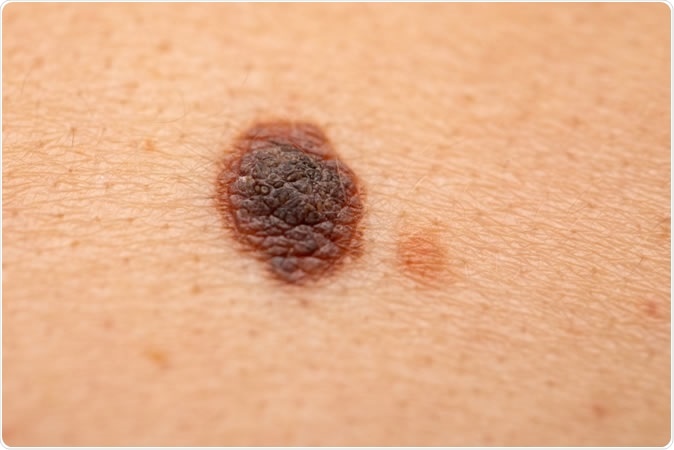Usually starting as a blemish, skin cancer can quickly develop and spread to other parts of the body. The deadliest form of skin cancer, melanoma proliferates rapidly through the lymph nodes, affecting important internal organs. The disease can be variable, wherein some cancer cells never metastasize to the blood and lymph nodes and throughout the body, while others, tend to metastasize.

Close up of melanoma. Ocskay Mark / Shutterstock
Now, a team of scientists has found how melanomas spread and why certain tumors are more likely to metastasize than others.
In a new study published in the journal Nature, researchers at the University of Texas Southwestern Medical Center found why certain melanoma cells are more likely to spread throughout the body. The findings of the study open the doors to noble treatments that can help reduce the number of cases of patients with stage 3 melanoma to progress to stage 4, which is more deadly.
Metastasis involves the spread of cancer cells from their origin to the other parts of the body. Usually, they penetrate the lymph nodes, making their way to vital organs like the brain and lungs. The researchers show that metabolic differences among melanoma cells confer differences in the metastatic potential, due to the differences in the function of the MCT1 transporter.
Since metastasis is a major determinant of the patient’s prognosis, the researchers focused on understanding why some melanoma cells are better at metastasis than others.
Testing the hypothesis
The team found that melanoma cells are more likely to spread to surrounding tissues and organs if their cells have high levels of MCT1, monocarboxylate transporter 1, on their surface. MCT1 involves the gathering of lactate in the blood and deliver it into the tumor cell and heighten the chance of survival.
To land to their findings the team worked on laboratory mice. They injected the mice with human melanoma cancer cells that had high or low concentrations of MCT1. The animals who received high concentrations of MCT1 were at a higher risk of metastasis, while those who received melanomas with low levels of MCT1 were less likely to spread to surrounding areas.
“Efficient metastasizes are able to take up more lactate, which allows them to increase their production of antioxidants that help them to survive in the blood,” Dr. Alpaslan Tasdogan, a postdoctoral researcher in the Morrison lab and lead author of the study, said. “The findings in our paper, along with those made previously by the DeBerardinis lab, strongly suggest that increased lactate uptake by cancer cells promotes disease progression. This correlates with clinical data showing that patients with higher levels of MCT1 in their cancers have worse outcomes,” he added.
Inhibiting MCT1 doesn’t have much of an effect on the tumor itself, but it can help prevent metastasis. The study raises the possibility of using MCT1 inhibitors for patients who have melanoma. This way, the spread of the cancer cells will be prevented, or it can help reduce the proportion of patients who develop distant metastases.
“It’s a great example of how assessing tumor metabolism can identify differences that correlate with cancer aggressiveness. Then you can identify an activity related to metastasis, inhibit it with a drug, and reduce metastasis in the mouse. That’s remarkable,” Dr. DeBerardinis, Professor at CRI and an HHMI Investigator, said in a statement.
What is melanoma?
Melanoma is the rarest type of skin cancer but tends to be the deadliest. It’s a type of skin cancer that develops from melanocytes, the pigment-containing cells of the skin.
Though the exact cause of this type of skin cancer is still unclear, exposure to ultraviolet radiation from sunlight or tanning beds may increase the risk of developing melanoma.
Journal reference:
Tasdogan, A., Faubert, B., Ramesh, V. et al. Metabolic heterogeneity confers differences in melanoma metastatic potential. Nature (2019) doi:10.1038/s41586-019-1847-2, https://www.nature.com/articles/s41586-019-1847-2